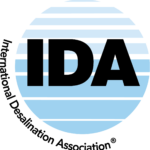Boston, November 8, 2021 – The International Desalination and Reuse Association announces the Nomination period for IDRA 2022-2024 Board of Directors Election will open on January 6, 2022.
Schedule
| Nomination start date | Jan 6, 2022 |
| Nomination close date | Feb 26, 2022 |
| 2022-2024 IDRA Board of Directors Election Voting Opens | Mar 9, 2022 |
| 2022-2024 IDRA Board of Directors Election Voting Closes | Apr 27, 2022 |
| Results Announced and Posted | May 1, 2022 |
| Board Transition | Oct 2022-IDRA World Congress, Sydney, Australia |
Nominations
Candidates must be continuous active members in the IDRA since July 2020 to be eligible to stand for this election. The IDRA board is a working board with several standing and special committees. Candidates should have strong industry knowledge and understanding of IDRA’s mission, Constitution and Bylaws, and availability to dedicate a considerable amount of time to their duties should they be elected. Directors are expected to attend two board meetings per year, actively participate in IDRA’s programs, events, and committees, undertake special assignments.
Candidate Eligibility
To be placed on the ballot, candidates must have been:
- Selected by the Membership and Elections (M&E) committee.
- Proposed by letter or petition by at least five Class I and Class II members or their designated representatives from the same region.
- Submit a written request to the M&E Committee to be considered for election and be sponsored by at least five Class I and Class II members or their designated representatives.
Candidates must: (a) be prepared to serve the desalination and water reuse community rather than espouse the particular interest of any single entity; (b) maintain confidentiality on the business of the Board; (c) avoid prejudiced judgments on specific issues; and (d) have a good standing within the desalination and water industry.
Regional Representation
Regional representation has been defined by the proportion of active Class I and Class II members in good standing in each region. Twenty-one (21) directors may be elected to the Board of Directors, and each region may have at least one and no more than seven. Based on the membership numbers, the regional allocation of Directors for the 2022 election is as follows:
- Europe – 5
- Latin America, Caribbean – 1
- Middle East Africa – 7
- North America – 4
- Pacific Asia – 4
Elections
Directors are elected by a direct vote of IDRA’s Class I and Class II members. The Membership and Elections Committee asks that each candidate provide:
- A high-resolution photo.
- Short biography.
- Brief description of what they intend to contribute to the Association.
Ballots will be sent to all active members via E-Ballot on March 9, 2022, and voting will begin. IDRA members will be able to log in and vote electronically. Voting will close on April 27, 2022, and results will be posted on the IDRA website (www.idadesal.org) by May 1, 2022, and an email bulletin sent out announcing the elected directors. The transition of the Board will take place at the IDRA World Congress in Sydney, 9-13 October 2022.
From January 6th to February 26th, 2022, Members can send nominations to Ms. Shannon McCarthy, IDRA Secretary General, at info@idadesal.org, with the subject noted as: Nomination for Term 20 IDRA Board of Directors. Self-nominations are also accepted.
About IDRA
The International Desalination and Reuse Association is the point of connection for the global desalination and water reuse community. A non-profit association established in 1973, IDRA serves members in more than 60 countries and reaches an additional 4,000 affiliate members through 15 affiliate organizations. Its membership comprises professionals from government, private sector, international organizations, research centers, and universities. IDRA is associated with the United Nations as part of a growing global network of non-governmental organizations (NGOs) and is a member of the UN FAO WASAG, the Global Framework on Water Scarcity.





